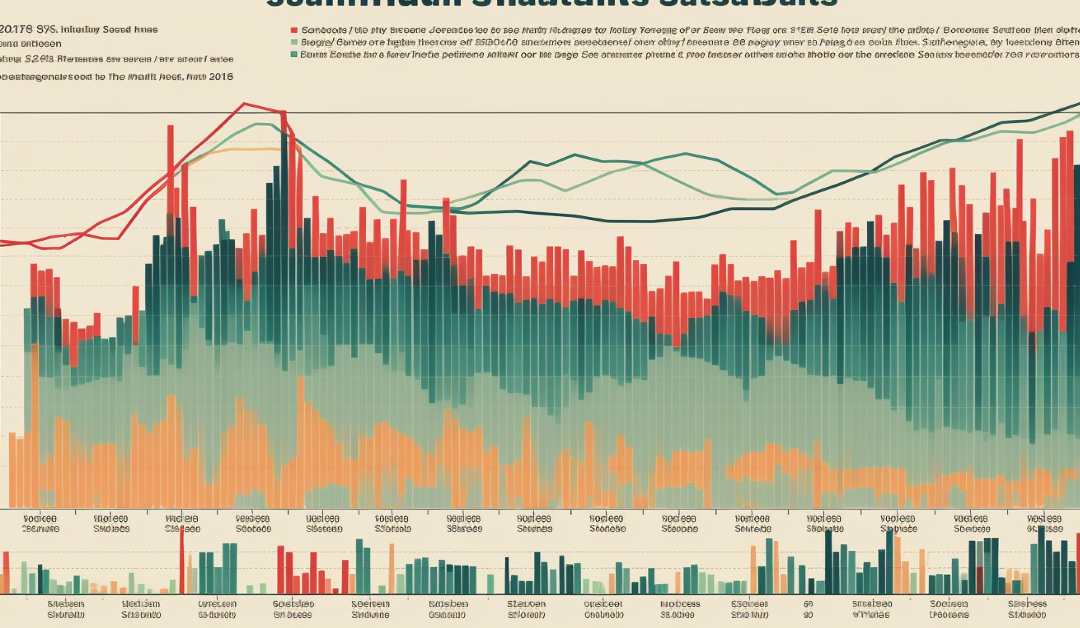
by Samuel Mbaki | Jun 22, 2023 | Banking
Key Points
- Tayyip Erdogan’s Finance Minister has introduced another 6.5% rates hike taking the total to 15%
- The move marks a turnaround for the residents of Turkey as their money faces great devaluation owing to a high inflation rate.
- As the Ministry of Finance fights an economy-crippling inflation menace, more pain is expected in the Turkish markets for the next short to mid-term basis.
On Thursday, the Central Bank of Turkey delivered another large interest rate hike to battle the overshadowing inflation rise. The move signals a shift towards more conventional economic policies to counter the sky-high inflation rates following the criticism that Tayyip Erdogan had led to higher living costs.
Turkey to brace for more pain in the markets
Residents and Citizens of Turkey will have to brace for tougher economic terms, at least in the short to mid-term, as the Central Bank and Finance Ministry work hand in hand to shave off the sky-high inflation rates that have crippled their economy.
On June 22, the Central Bank announced that it had raised key rates by 6.5%, now boosting it to 15%. This boost is a significant jump from the existing 8.5% that was in effect since March 2021 and follows Erdogan’s new term as the President.
Erdogan has been under fire for watching the cost of living overwhelm the citizens of Turkey. The recent rate hike indicates that the country is moving away from Erdogan’s unorthodox belief that lowering interest rates fight inflation.
This traditional economic theory has proved ineffective, and central bankers worldwide have been going at it differently. The US and UK have both raised interest rates to deal with inflation. Only time will tell how high Turkey will need to set its inflation rates hike before completely taming it. Keep watching Fintech Express for updates on finance and other fintech-related developments.

by Samuel Mbaki | Jun 22, 2023 | Banking
Key Points
- Stocks in the Eurozone have plummeted as the Markets anticipate a decision from BoE over the interest rates policy.
- Market sentiment is sour after US Federal Reserve Chair Jerome Powell forecasted more rates hike for 2023
Eurozone has received news on the necessity for further rate hikes in a sour way making the stocks plummet as they await today’s decision from BoE. The Benchmark Stoxx 600 was down 0.92% at the open Thursday markets, with all sectors trading in the red.
Eurozone stocks plummet ahead of expected rates hike
Inflation rates in the US and the UK are still way above the targets of 2% by the end of the year. As such, more action is needed from the banking heads to keep the economies floating while driving down inflation. While the US has paused rates hike for June 2023, the UK is expected to hike its rates following a positive report from its jobs markets.
This decision will cause more pain in the markets as borrowing money will be more expensive. As a result, the Eurozone Stock market has reacted negatively as it digests the information, with key stocks like the STOXX 600 index falling by almost 1%. All sectors also traded in the red section, with the Automobiles sector falling by 1.55% as banks topped with 1.9%.
The STOXX 600 index has posted declines in all sessions this week.
“Nearly all FOMC participants expect that it will be appropriate to raise interest rates somewhat further by the end of the year,” Powell said in remarks prepared for testimony before the House Financial Services Committee Wednesday.
UK investors now focus on the Bank of England decision, which is set to hike rates by around 25 or 50 basis points as inflation rates remain stubbornly high. These developments came when the Swiss National Bank announced a 25 basis point rate rise, its fifth consecutive hike on Thursday, pushing its rates policy to a 1.75% high.
Analysts are calling for investors to be more cautious with the markets as it will be a long road to reducing current inflation rates. As such, more pain is expected to hit the markets as uncertainty about the total recovery period looms as ‘key’ economies like the US and China are also distressed. Keep watching Fintech Express for more updates on banking and Fintech-related developments and news.

by Samuel Mbaki | Jun 20, 2023 | Banking
Key Points
- It is a precarious situation worldwide as most economies face tough times necessitating action from Central Banks.
- Globally, different stances have been taken by respective Central Banks in June to cope with the rising inflation and recession fears.
Central Banks worldwide have showcased commitment to dealing with wild inflation and evading possible reversed GDP growth. These efforts are necessary as costs of living are increasing in the short term, and if no action gets taken, they could go wild in the future, crippling the basic functioning of the economies in question.
Central Banks keeping the fight against inflation alive
On Thursday last week, the European Central Bank increased interest rates while the U.S. Federal Reserve opted to pause it. These decisions came just days after China’s Central Bank lowered its key medium-term lending rates while Japan’s Central Bank left its ultra-loose policy unchanged.
From hawkish pauses to rate hikes and dovish tones, the world’s biggest Central Banks are taking different strides to deal with the almost ‘common’ economic threats. However, it doesn’t come without surprises or criticism as markets digest the new policies.
The hikes rates by the European Central Bank on June 14, 2023, surprised the markets with a worsening inflation outlook which led investors to consider even more rate hikes for the Eurozone.
This decision followed the federal reserve’s rates hike pause. It didn’t go without surprises and reactions from the market. Ruslan Lienkha, Chief of Markets at YouHodler, talked with Fintech Express and told us that Powell still has a long way to tame inflation rates and maintain market balance.
He added that while rates hike at later dates are not ruled out, the markets won’t be very happy with the tough decisions that must be made. In his words, he said:
“It is too early to say that Powell is winning the fight against inflation. I don’t think bringing inflation to 2% will be so smooth. The main concern is about the too-hot labor market at the moment. Therefore, the Fed can later decide to continue the rate increase or keep high rates for a significantly long time – such scenarios are quite possible and might disappoint financial markets in one or a few months.
As for crypto, the major cryptocurrencies will follow traditional markets. The only question is the degree of this correlation, which we still need time to figure out.”
In the Eurozone, inflation rates have plummeted, but it still is necessary to keep pushing as it’s far away from ECB’s target levels. This is also the same case in the U.K. BoE is expected to raise rates this Thursday as the country still has very strong labor data.
The markets are, however, different in Asia. China’s economy has lost the momentum hoped to be there for post-COVID-19 recovery. As such, it has stalled with falls n both external and domestic demand forcing policymakers to step up support measures to revive the growth momentum. These developments across the world show that there is still a lot to be done if Central Banks hope to regain control of economies and ease the costs of living.
Keep watching Fintech Express for updates on banking and other Fintech-related developments.

by Samuel Mbaki | Jun 19, 2023 | Banking
Key Points
- The Bank of England has researched with help from the Bank of International Settlements, finding out that digital Central Bank coins could make peer-to-peer payments faster.
- This research is a step closer to BoE’s launch of a CBDC named “Britcoin”.
Brits are set to receive Britcoin, a Central Bank Controlled Digital Currency (CBDC), as the Bank of England gets wowed by the potential of digital currencies. Following a successful trial study called Project Rosalind, BoE is more confident than ever in the functionality of Britcoin.
Brits to get “Britcoin” eventually
Project Rosalind is a study concluded by the BoE and the Bank of International Settlements that seeks to understand the place of a CBDC in a digital economy. It was used to evaluate how effective a CBDC would be in running the U.K. economy and assisting citizens in their usual day-to-day activities. It has been completed and achieved amazing results for the Bank of England.
Therefore, BoE plans to launch a CBDC of its own. This coin is to be named “Britcoin” after the words “British and coin”. This coin would not be the only one of its kind. China already uses a digital Yuan, with the U.S. and Russia researching theirs.
In addition to how Britcoin could be used by citizens digitally, the Rosalind Study also dived into the concept of “programmability” That means the U.K. government will get to program the coin to behave in a certain way when given conditions are met.
“The Rosalind experiment has advanced central bank innovation in two key areas: by exploring how an API layer could support a retail CBDC system and how it could facilitate safe and secure CBDC payments through a range of different use cases,” said Francesca Road, head of the BIS London Innovation Hub in a press release.
However, despite a successful study on Project Rosalind, BoE Deputy Governor Jon Cunliffe said that the decision on the introduction of a CBDC in the economy remains years away. This information is similar to the one offered regarding a digital dollar.
Last week, a treasury official expressed that it will take more than designing and using a digital dollar to harmonize the digital and traditional economies. The official said there are still some fears about things like the collapse of banks that keep the digital dollar launch decision years away though research will continue. Keep watching Fintech Express for updates on this and other Fintech-related developments.

by admin | Jun 14, 2023 | Banking
Key Points
- ‘Official’ plans for a U.S. digital dollar still not introduced as research remains underway.
- Treasury’s Graham Steele expresses concerns about the validity of a CBDC in the U.S.
- Steele is concerned that a CBDC could trigger a bank run as people rush to withdraw their currencies from banks.
A digital dollar is still not sitting well with treasury Official Graham Steele on worries that it could very well trigger bank runs. Steele thinks that the in-research digital dollar could encourage further withdrawals from banks, weakening an already shaken system.
A digital dollar could be a thorn in the banking system.
While talking at a payments conference in Austin, Texas, on June 13, 2023, Graham Steele said that the U.S. has not yet decided on whether to pursue a central bank digital currency. However, an interagency working group is already in place that is researching the implications of such a currency.
He expressed his thoughts, saying that a retail CBDC will drive out further deposits from banks instead of a wholesale CBDC that is only available to institutional investors. The retail CBDC would allow individuals and businesses to conduct normal day-to-day activities, gradually replacing the common notes and coins.
In his words, Steele said
“A retail CBDC could contribute to a more competitive and innovative payment system; support financial inclusion; and help preserve the face value redemption of the currency. ” He added, “There were caveats: design decisions — such as the range of intermediaries acting as CBDC service providers — would impact those potential effects.”
Steele noted how we had seen banks such as Silicon Valley Bank and First Republic fall due to increased withdrawals than the available deposits. He said that other banks could follow if a retail CBDC gets offered and investors seize the opportunity to hold their money digitally.
“As we have seen in the recent episodes of banking turmoil, a combination of technology, highly concentrated depositor base, and access to non-deposit alternatives outside of the banking system may have changed the nature and speed of bank runs,”
“With the technology enabling the movement of deposits only getting faster, there could be additional risks associated with the introduction of CBDC.”
But a digital dollar is already in the works, Steele?
A digital dollar is not new in the U.S. as it has had a green light to be researched and explored. Last March, President Biden signed an executive order encouraging Federal Reserve to explore a digital dollar that abides by national interests.
In November 2022, information surfaced that nine major banks were working hand in hand with the Federal Reserve Bank of New York to test the feasibility of a digital dollar. The CBDC would be based on distributed ledger technology.
The banks involved in the pilot phase of the digital dollar include Citibank, Wells Fargo, Mastercard, PNC Bank, T.D. Bank, Truist, BNY Mellon, HSBC, Wells Fargo, and U.S. Bank.
The U.S. digital dollar will be in the form of tokens like what is happening in the crypto industry, only that it will be settled and simulated via Central Bank Reserves on a shared multi-entity distributed ledger. Keep watching Fintech Express for more updates on Finance, Banking, and other Fintech-related developments.

by Samuel Mbaki | Jun 13, 2023 | Banking
Key Points
- China’s Central Bank slashes its seven-day reverse repurchase rate by 10 basis points from 2% to 1.9%
- Onshore Chinese Yuan devalues by 0.25% to 7.1618 against the U.S. dollar
- Further monetary easing lies ahead of China as Central Bank cut deposit rates
People’s Bank of China revises monetary policies as the economy takes a hit
China is in for an easier time as the People’s Bank of China (PBOC) reverses key monetary policies. The bank cut a key short-term policy following disappointing data from the economy after the nation failed to rise as expected following the Covid-19 reopening.
PBOC has slashed its seven-day reverse purchase rate by 10 basis points, taking it from 2% to 1.9%. According to a press release by the bank, the move in jects 2 billion Chinese yuan ($279.97 million) through its seven-day repos.
This move marks the first time the Chinese government has made such a policy since August 2022. It comes ahead of the PBOC’s medium-lending facility interest rate decision that is slotted for June 15, 2023. The bank’s loan prime rate is also scheduled for release on June 20.
“Now we are going to see the Chinese [monetary] policy will become more supportive,” Atlantis’ Chief Investment Officer Yang Liu told CNBC’s “Street Signs Asia.”
“Basically what the Chinese government is [expected] to do [is] to try very hard to prop up the domestic consumption, especially in the private sector,” she said.
Keep watching Fintech Express for more updates on banking and other fintech-related news and developments






